
Biology
202
Neurobiology and Behavior
Spring 2006


| Biology
202 | 
|
The challenge in general
Review of Blink, NY Times Book Review, 16 January, 2005
The response in general
| Biology major? | 18 |
| Psychology major? | 4 |
| NBS concentrator? | 7 |
| Other majors | English (7), Sociology (5), History (3), Linguistics (2), Philosophy, Russian, Creative Writing |
| Undecided | 3 |
| Satisfy science requirement | 5 |
| Interested in biology/nervous system? | a lot |
| Interested in psychology/behavior? | less than a lot |
| Interested in philosophy/nature of reality/human experience? | less than less than a lot |
| Interested in practical problems? medicine, psychiatry, social activism, etc? | more than a lot |
| Want to understand who you are? why you/other people behave the way you/they do? What you/they can do about it? | more than a lot |
Neurobiology and BEHAVIOR ... what is "behavior"?
NEUROBIOLOGY and behavior ... Neurobiology = study of the nervous system ... what is the "nervous system"?
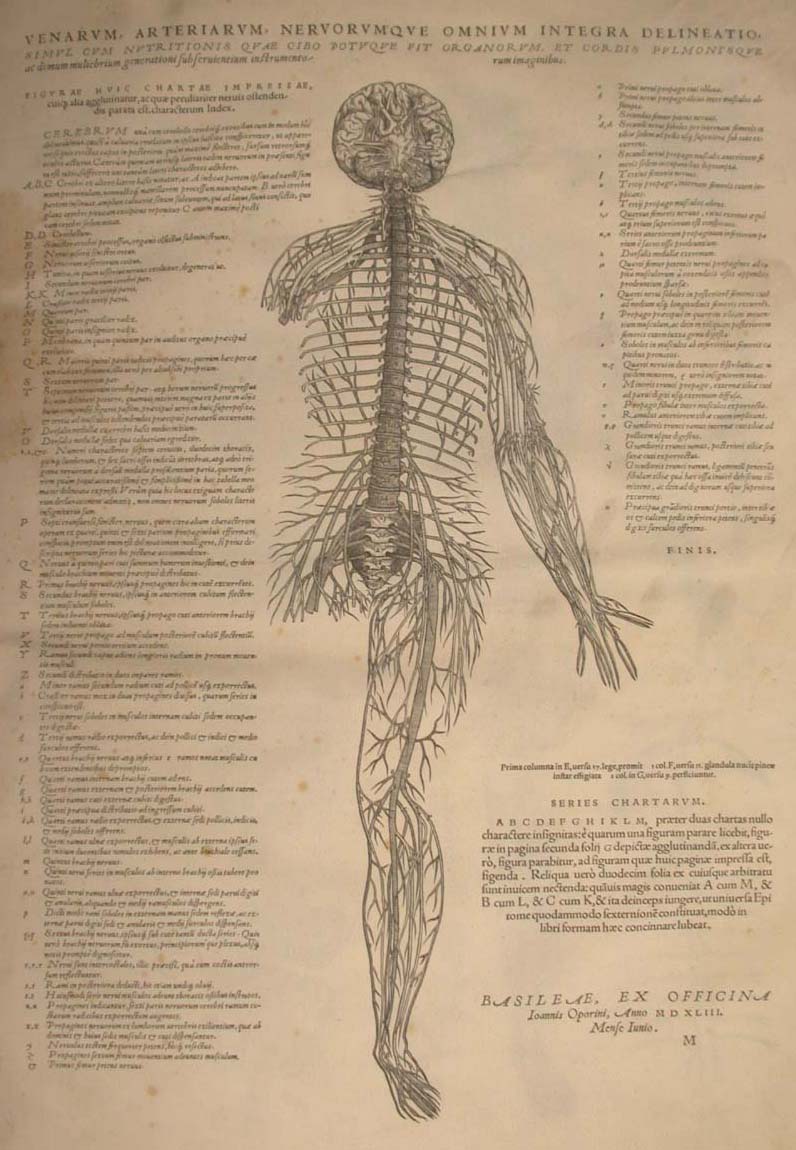
| Image by Andreas Vesalius (1514-1564), contemporary of Copernicus, suggested (less than 500 years ago) that nervous system rather than heart was origin of behavior (see Milestones in Neuroscience Research for a time line extending from 4,000 B.C.). | 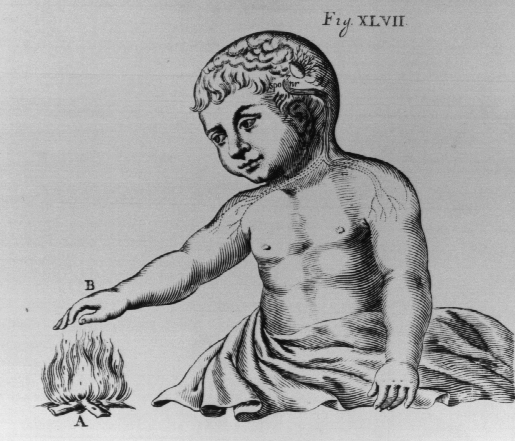
| Image by Rene Descartes (1596-1650). Set framework for several centuries (and continuing) discussion: mind and body distinct things or same thing? |
| Nervous system is material object, part of body, can be touched, manipulated, measured. What IS the relationship between brain (nervous system) and behavior (broadly defined to include human experience)? Subset of this are questions such as the relation between mind and brain, mind and body, matter and spirit, matter and form ... | |||
| Agree with Dickinson et al. | 3 |
| Disagree with Dickinson et al. | 14 |
| Unsure/fence-sitting | the rest |
|
(for future consideration) Are the brain and the spinal cord fundamentally different or elements of one larger system that have comparable degrees of sophistication? If a tree falls in the forest and their is no one there to hear it, does it make a sound? "what about organisms that don't have brains? Do they exist without a brain? ... what about organisms that do have brains? Do their brains have the same capacity as human brains to be "wider than the sky"?" ... Carolyn D. "Why is it, then, that some people are more able to control their behavior than others? ... Could brain equals behavior a little more in some of us than in others?" .... Claude "is [Dickinson] saying that since god can be contained in the brain, there is no god without the brain? just like the sky? ... Em |
Issue is not "Truth" but whether there is a good "summary of observations", "working hypothesis", something that contributes to getting it continually "less wrong" is useful for the ongoing generation of new stories in science and in culture at large ...
Start with overview of the "trend of the evidence":
|
(for future consideration) How do "eating disorders" relate to the brain=behavior idea? Are they "mental illness" or "mistakes"? Is "self-awareness" part of brain? What is the relation of brain=behavior idea to "inside/outside"? Doesn't behavior depend on what is "outside" as well as on what is "inside"? |
Our task for the semester (and beyond?):
Let's roll ... Forum area this weekend: YOUR thoughts on "brain=behavior", on science, on ... ?
Starting with what one thinks .... and getting used to/seeing the advantages of being wrong
|
The nature of science Is everything a science, in a way? ... Emily L. (see also Rebecca and Anne-Marie and Nancy) sometimes theory (heroically) precedes observations ... Brooks It requires some sort of training and experience in order to actually be a scientific thinker ... Andrea is nothing really certain? ... Lori Human history, therefore, could be seen as a series of hypotheses and then a whole lot of waiting around to see whether or not later events support or go against those hypotheses ... Brittany The definition of behavior I am quite dissatisfied with our current definition of "behavior;" it seems lazy to dump every option we can think of into one category, especially considering traditional bio. definitions of behavior. I am looking forward to improving/exploring it as the semester progresses ... Julia I feel that behavior has to be explored in terms what the brain thinks is going on as well as what is actually happening. Saying that a stimulus is being applied is doesnŐt help us understand behavior unless the brain thinks/knows that a stimulus is being applied ... Caroline Brain=behavior? is she [Dickinson] saying that since god can be contained in the brain, there is no god without the brain? just like the sky? ... Em Is the brain really all that stands between us and oblivion? ... The belief that there is some greater force "out there" is comforting. ... Tamara (see also Trinh) If human brain is arguably one (or one of the few) things in the universe capable of thinking about itself, why don't we give some weight to its self-reflections, as well as to the 'hard' observable data? ... Mariya ideas cannot be ignored as part of the scientific process ... Scott what about organisms that don't have brains? ... what about [other] organisms that do have brains? Do their brains have the same capacity as human brains to be 'wider than the sky'? ... Carolyn (see also Jen and Nicky and "The Animal Self") such an arrangement would lead to a rather reactive behavior - all behavior would be reacting to the world based upon previous reactions ... Astra It is difficult to explain the inconsistencies that exist in different people's behavior ... Could brain equals behavior a little more in some of us than in others? ... Claude Why is the brain so sensative to chemical dependancy to alter behaviors? Can you as a person override the chemical tendencies towards a certain behavior, maybe induced by environmental chemical stimuli? ... Danielle (see also Sylvia) Can we allow for experiences (in childhood, or even beyond) that impact and continually alter chemical levels? ... Courtney Behaviors like exercising, causing the release of the endorphins, or drinking alcohol, or doing drugs, all change the brain's chemistry ... Brom What then is causing someone to malinger if it's not their brain? ... Rachel what exactly constitutes a thought? If, as Astra said, cognitive behavior consists of a process involving neurons and synapses, can reflexes and other such unconscious movements be included in the act of thinking? Is a Freudian slip merely a 'mistake' that a neuron made or is it something more? ... Perrin there are many people who have eating disorders who clearly do not have tumors. So what exactly is going on? Different changes in the brain are leading to the same behavior ... Fatu if there is only the brain what made the brain the way it is? ... There would have to be outside elements ... yes, I know the world is viewed different for everyone and the way one perceives the sky or the earth or the universe for that matter varies as well but I feel each persons understanding of those things are basically the same. Lastly, if there is only the brain then what the mind is, is it just created by the brain as well? ... Whitney maybe things exist without us, but they don't exist in the same way. I have often wondered if people perceive things the same way that I do ... Amber things such as language (and perception), the behavior, are influenced by what people are taught culturally, not by physical features within the brain ... Claude what about the act of dreaming? ... I would like to think my dreams have meaning, but what if my dreams are just delusions and distortions of reality? How does my brain enable my mind to play tricks on me? ... Ebony But when we do finally see where everything originates in the brain, then what? Are we ultimately going to try to alter the brain and make everyone identical? ... Gray a better definition needs to exist between brain and the rest of the nervous system and how this unit correlates to behavior. Do we want to simply look at them as one unit, that generate behavior together or look at the interaction of units and see how that impacts behavior? ... Liz |
IF Emily is right:
How do we THINK the nervous system works, and how DOES the nervous system work? ... (What else must it be like if Emily et al
right)? ...
and a starting case, the cricket (Bentley and
Hoy, 1974)
Some starting points: a sphagetti bowl?
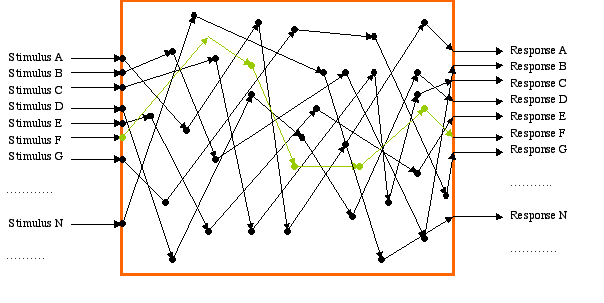
| Virtues
|
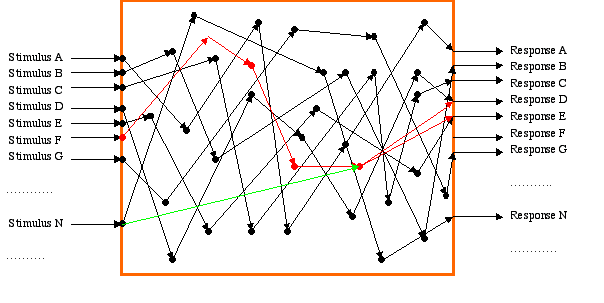
| Virtues
|
A rethinking - boxes in boxes
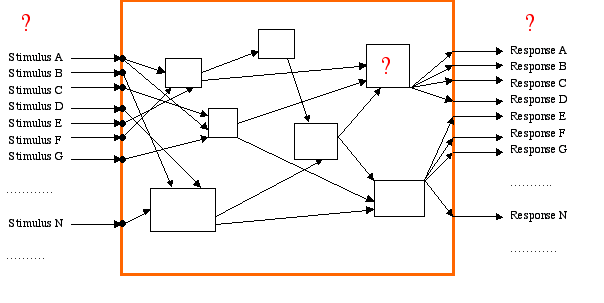
| Virtues
|
Facing up to the stereotopy, stimulus-response problem ... freeing the box from the outside world, adding autonomy
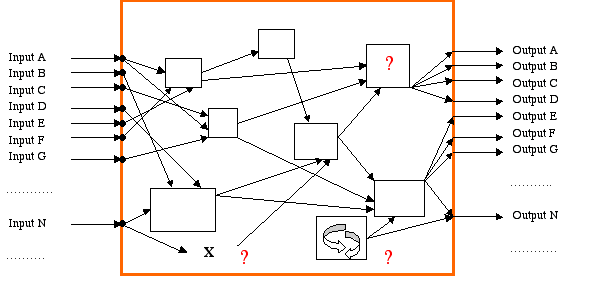
| Virtues
|
If brain=behavior then the nervous system must not be a stimulus/response machine (nor a bag of chemicals that is invariant and the same in everyone. It must instead be somewhat different in different individuals, be affected by both genes and experiences/culture, and be capable of different outputs for the same input as well as generating outputs with no input .... an input/output box consisting of input/output boxes.
|
(for future consideration) Do we want/need a demarcation between withdrawing one's hand from a flame and dreaming? Why or why not? If so, how should we make it in terms of the nervous system? Is there a distinction, in terms of the nervous system between "good" and "bad" behavior? If "personal experience" is a necessary component of observations relevant to understanding the nervous system, how do we deal with its being "private", "subjective", not accessible for public observation/confirmation? What is "private", "public", "subjective", "objective" in terms of the nervous system? Is science "progressive"? Are the humanities, literature, art? Life? What is "progress" in terms of the nervous system? from the news A Shocker: Partisan Thought is Unconscious This is Your Brain on Schadenfruede. Do You Feel Bad About Feeling Good? |
Go on to look at actual nervous systems to see if they satisfy expectations and to
address issues ... further iterations ("getting it less wrong") to come?
The "real" nervous system - an input/output box consisting of interconnected input/output boxes?

| 
|
| photo from Kemali and Braitenberg, Atlas of the Frog Brain, Springer-Verlag, 1969 |
Each box in turn (somewhat arbitrarily) subdividable into smaller boxes (with some differences among vertebrates, to return to)
And those ... yes, "its boxes all the way down"
The smallest box: neurons everywhere
Invertebrate nervous systems also have neurons, but differently arranged - makes sense?
Neuron as common, smallest box and as input/output element, connected to other boxes
Can use boxes->boxes ... ->boxes(neurons) to show that larger boxes interconnected, in relatively specific ways (anatomical specificity) and to rigorously specify "input" and "outputs" of largest box ... nervous system itself
So ... at least parts of our box within box model real ...
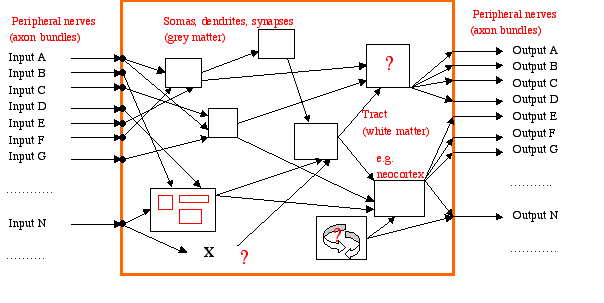
| Additions:
|
|
(for future consideration) Lots of neurons, therefore lots of room, both for individual variation and for things going on in there If consciousness is "inside", where is what one is conscious of? And what does "outside" or "inside" mean in terms of the nervous system? (as opposed to from the perspective of an observer of the nervous system?) |
|
Science I don't agree with the idea that the scientific method does not apply to life because of a lack of progress ... the person participating in self-destructive behavior, such as alcohol or drug abuse is constantly observing the effects this behavior has on them and their lives and making the choice to continue doing it so they are still using the scientific method to get to that conclusion ... Rachel M. (see also Jen) Brain = Behavior? Plants exhibit behaviors such as reproduction and growth, but plants aren't able to experience Schadenfreude like us. I think this calls for a demarkation between the types of actions organisms exhibit as a result of thinking (even if we don't realize we're thinking) versus actions that are purely a result of a response to an "input" or stimulus ... Ebony (see also Anne-Marie)
I agree with Rachel F... how exactly do you account for behavior that has nothing to do with the brain or malfunctions of the brain? ... Sylvia I think the Harvard Law of Animal Behaviour is a rather mundane and silly discovery ... It's rather presumptuous to presume that animals will react any differently from humans when stimuli are introduced. There is always a choice when it comes to what behaviour will be expressed by one affected by a stimulus ... [the female cricket's brain will always show that she has heard and recognized this chirp. The second part of this behaviour, the outside manifestation, does not have to always be the same. She can react in may different ways externally, but the brain chemical reactions will always be the same ... Tamara Nature/nurture So then is this a nature/nurture thing, where we are given a brain that is genetically formed one way, but the way that we are raised and the experiences we have can change/form our personality? Does that then mean that these experiences actually physically change the way the brain works, in order to change our behavior? ... Marissa (see also Caroline and Astra and Stephanie and Danielle and Claude and Christin) Now that I think about it, conditioning has a very big effect on everyone's behavior. How does it really work? Like biologically, at a neuron level? ... Emily L. (see also Brittany) think about all those possible boxes and all those possible combinations! how could there possibly be one set-up for males and one set-up for females?? there must be nearly infinite variations on gender with all those permutations ... Em (see also Does Biology Have Anything to Contribute to Thinking About Sex and Gender?") The "unobservable"? how does intuition fit into the brain=behavior proposal? How can we explain/describe the sometimes irrational "hunches" and bold guesses, which often lead to break-through discoveries, in terms of interactions within the brain? What about the fact that scientists literally make discoveries in their dreams? Do they arise from the interplay between the "conscious" and "unconscious" boxes within the nervous system? Actually, do we still want to think in terms of "conscious" and "unconscious" in this class? ... Mariya these unobservable behaviors may pave the way for new hypotheses and future research; they could very well be considered "undeniable fact" in 50 years ... Andrea I was thinking about how the neocortex interacts with the rest of the nervous system. If the neocortex is our consiocusness, then that is all that matters to our interpretation of the world. If we could create the correct stimulation to it, we would sense a world that isn't there in a sense. So what do this power to override do to the rest of the boxes. Maybe nothing. But I wonder if all that matters is this box and what its percieves inputs are, regardless of what the actual inputs to the other parts of the nervous system are ... Liz P. Brain=behavior and cultural values I enjoyed Gray's posting challenging the aim of mapping the brain, and, it seemed, offering a word of caution against the potential homogenizing effects of identifying a "standard" for neurochemistry, and I wonder if this isn't the aim of many such medications - enforcing a standardized ideal of mental health or "happiness" ... Courtney (see also Bethany and Paul and "medical model" vs "biological/neurobiological model" and Culture as Disability) Drug A doesnt always produce result A on everyone since everyone is very different. Psychiatrist and psychoanalyst should explore talk therapy as an alternative or complementary remedy to psychological conditions, because just as behavior is influenced by the chemicals in the brain, the brain can be influenced by behavior to make chemicals to affect itself ... Trinh |
Invertebrate nervous systems also have neurons, but differently arranged in detail, same principles - makes sense?
Continue looking at actual nervous systems to see if they satisfy expectations and to address issues ... further iterations ("getting it less wrong") to come?
The "real" nervous system - different if behavior different?
Outputs - topographic organization - anatomical specificity
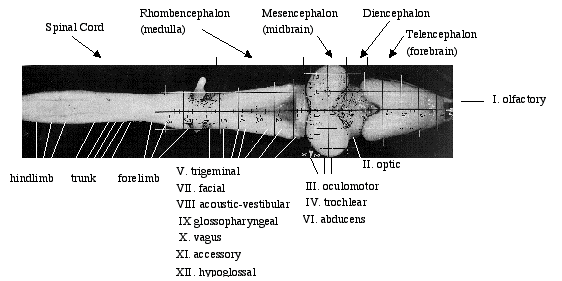
| For additional information: |
Observations "surprising", but have to be accepted - Issue is "how to make sense of them"
Two kinds of behavior ("reflex" versus something-else) intuition probably not useful
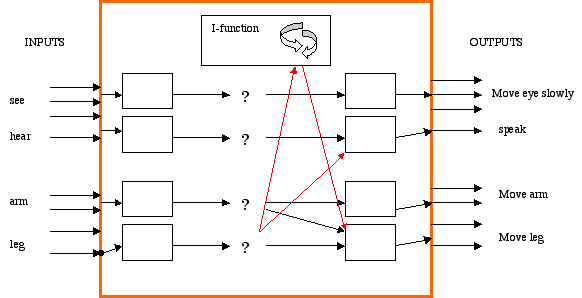
| Ascending somatosensory
pathways Descending motor pathways
|
|
Science I walked into this course with the prejudice that neurobiological theory as it stands is "wrong" and that therefore it is only useful insofar as I can learn something by demonstrating its fallaciousness ... regardless of what is currently measurable the systems methodology relies heavily on constructs to fill empirical gaps in the explanation of behavior. This means that the cutting edge of neurobiology will always rely on theory to be one step ahead of observations. Because the paradigm is very theory dependent, you should not be fooled by its pretension to an objective empirical grounding ... Brooks
Brain = Behavior? If we can show that certain behaviors that people exhibit are biologically based, they may make no effort to control these behaviors ... Claude If choice is just a random pattern in a certain box in the nervous system what initiates that pattern? Is there any way of changing the brains structure that would change an individual's choice? And is this measurable? ... Whitney the best outcome for patients is often reached through a combination of western scientific approaches and eastern holistic approaches. If it works, it works, but it would be nice to have a better grasp on how to get from point A to B so we could use both types of treatment to maximize patient care/recovery. Our lack of understanding lies in our vast ignorance of brain and body function ... Julia P.
Language When we listen to someone speaking, do the same neurons fire as those that would if we were saying what they are saying themselves? What about sign language? ... Bethany I think we fire different neurons when speaking and listening because they are two separate actions .... Christin The comments about native language versus a non-native language that is learned past a certain age are interesting. Is it that different neurons are firing or that it is the same neurons, but that they are arranged in a different pattern? Is it like the metaphor with music that we discussed in class where different patterns of the various instruments make different symphonies? ... Anna ... also (Suzanne, Bethany) It is interesting that someone else has raised this question because lately I have been very conscious of almost translating when I am listening to other people talk ... I first noticed this last semester when I was taking a Spanish class that was much more intensive than any I had taken before. As the semester progressed I noticed that the kind of translation I had to do in my mind was different from just pairing the Spanish word with the English word but instead kind of processing the Spanish word ... it's a long way of saying that I do think that we have to "fire" the same neurons when we read or listen to words that we would have to fire if we were saying them ... Nicky
Quadriplegia When we were first discussing Christopher Reeve's injury I was surprised to find that when his toe is pinched, his foot will withdraw. I originally thought that he wasn't able to move anything below his waist ... I realized afterwards that doctors simulate this same phenomenon when they give patients a spinal block. I happened to have received one when I had my knee operated on in October. After I woke up from surgery, I had no feeling below my waist allowing me to experience no pain, but when the doctor made my quad muscles contract, they did. ... Rachel F. (see also Stephanie) People who have had strokes sometimes retain "self" but sometimes do not ... Marissa It reminds me of people who snore and tell you "I don't snore". Their body is clearly doing something others percieve but there isn't an easy way to make them know that. To the self they did not do this ... Liz as a massage therapist, I've found that so much of the "self" can and should be defined beyond the rational thinking being ... Courtney reminded me a lot of another question that came up in class ... the infamous "if a tree falls in a forest does it make a sound?" ... This situation can be applied to a paralyzed person such as Christopher Reeves. When his foot is pinched, it draws back. Sensory neurons have relayed a pain message to the lower spinal cord and the spinal cord has induced motor neurons to move the foot but does the lower spinal cord *feel* pain? The rostral part of Christopher Reeves brain can verbally report sensations of pain, but the severed/separated caudal part of his brain cannot yet it still reacts ... so, is it capable of feeling pain? ... Carolyn
"I" does not simply mean the thinking, experiencing, and self-reflecting "I"", but the whole set of our behaviors, conscious or unconscious. I actually liked that understanding a lot because it was a way to resolve the mind/body dilemma by including the body, the conscious, and the unconscious into our definition of "I". I wonder whether this still holds true. If the "I-function" is located only somewhere "above the shoulders," wouldn't it send us back to the Cartesian split, at least in some sense? ... Mariya It would be interesting to examine the brain of someone with trauma induced "paralysis," blindness, or deafness to understand which parts of the nervous system are affected, if any... (i.e. how regions of the brain may appear different in one with hysterical blindness vs. one who is born blind.) ... Ebony If there were to be a brain transplantation between your physical being and another's, where will "you" be? ... Jen isn't it all together possibly that there are further levels of organization that extend beyond the boundaries of the brain to encompass the whole body, or even the whole environment? ... Astra
|

From Christopher Reeves
|
The "I-function"
|
If its all sensory neurons, motoneurons, interneurons, and signals moving among them, we need to look at signals, what they are, how they're handled ...
Signals:
Action potential - longitudinal battery which appears/disappears successively at successive points along an axon ("travels" at finite speed), "all or nothing" transient (millisecond range) event
To understand action potential, need first to understand resting potential - transverse battery, continuously present, with potential for continuous variation
|
Equating "self" with "brain" fails to acknowledge the extent to which we are reliant on our bodies for our selves, and the ways in which our non-nervous systems constitute the self. The classic philosophical example is the "brain in the vat." If the brain is the self, this entity should be a self, also, right? But without a body to provide input, the brain is useless - it doesn't even know that it is a self, or how to define that self without the ability to relate itself to the surrounding world ... Courtney This weekend, I broke my ankle. Granted the injury was to a region of my body far from my brain, my behavior has certainly been altered. I have to learn how to multi task with crutches and do homework with my leg elevated in bed. If brain = behavior, is it valid to say that my broken bones have had an impact on my brain in such a way so as to influence a change my in behavior? Or is this change in my behavior brought on by something separate from my brain? ... Ebony We are being asked to reject the Cartesian notion that the self is so high that it floats above the body, but in our own model we might hypothesize that the self is still the "highest" that you can get within the nervous system. Highness needs to have a meaning, and I think this notion of the highness of the self has something to do with the presumption that our egos are more or less in control of our behavior ... perhaps the self [mistyped as "brain"] receives commands--which it must obey--from a higher authority that has already processed information outside of the I-function ... Maybe pain is a higher, more primitive source of decision making that is located outside of the I-function. Or maybe pain is a remote control built inside of the I-function to be exploited by some nefarious stranger ... Brooks
In my mind, stimuli affects the brain, which affects behavior. It's a linear progression ... Julia I don't think that I see the self as being the highest box but rather the limit of perception. We can say that other parts of our body impact our mind ... However the question always lingers in my mind of whether those things that I think are happening are actually happening ... I keep coming back to this idea of whether or not there is anything here but my consicousness and my perception. ... from being a martial artist one thing that you learn to do is shut off pain. A choice by my conscious mind is now impacting my perception of the world around me. I don't really know how to rationalize that but I just think that looking from the opposite side (the mind's impact on the perception of physical body not the body's impact on the mind) is interesting. I was always amazed when reading those faith healing stories and I wondered if the power of the conscious brain could really change the physical form ... Liz
I was able to experiece the workings of propioception when I learned how to walk downstairs again after I had knee surgery. The muscles I use to walk downstairs were unused for almost 3 months. As my physical therapist and I tried to go through the motions of walking down a stair, my knee didn't know how to bend (it was as if the muscles were asleep). What helped me was watching him make the motion and then visualize making the muscles in my knee bend ... Rachel F. ... reminded me of how astronauts have to learn how to walk after traveling in space ... By watching others walk, our brains can register the information and, in turn, remember how walking feels. By watching others perform an action, our brains are able to understand how they are doing it, and can help us to mimic them ... Stephanie ... fascinating, particularly the idea that the "conscious portion of the nervous system relies on the "unconscious" portion for all information, which leads me to wonder what happens when the "unconscious" portion interprets the signal incorrectly. I hope we cover that in more depth later in the course ... Anne-Marie I am curious about why certain signals seem to "get through" to our brain, whereas others are ignored ... "cocktail effect" occurs when you are having a conversation while many other conversations are occuring around you. Although you tune out the other conversations and pay attention only to your own, as soon as you hear a stimulus (such as your name), your attention is directed to the conversation you had been ignoring up until that point. The question is: have you been ignoring it the whole time or have you been processing it in some other "box" other than your I-function? ... ADD? ... Many people have difficulty concentrating at some point in their lives or in certain situations. I wonder what causes us to sometimes be able to control the signals that get through to our I-function but other times, be helpless to distractions ... Rachel (also Danielle) When our desires or urges are shooting off signals for us to act to satisfy them, there must be another part in the brain that reconsiders this desire and the consequences of acting on it. Then when a decision of inaction is made, are the signals from the urges then ignored? Can the urges eventually be trained by the part that makes this decision to simply stop? To what extent can we control our involuntary desires or more specifically our awareness of them. Can we be our own anesthetics? Can we make ourselves not perceive pain, hunger, thirst or sexual arousal ... Trinh The Self and the I-function really are extremely fluid. In her memoir _Where Is the Mango Princess?_, Cathy Crimmins discusses her husband Alan's extreme personality changes after his TBI (traumatic brain injury) ... Christin how many boxes are in this box? ... Sylvia if we could say that the I-function itself were not an impenetrable box but rather just as fluid and multi-faceted as any other of the boxes we've talked about, i'd be very happy ... Em (see also Andrea and Jen) I think I would even go on to say that in talking about identity scientific progress can no longer claim that it is getting the story less wrong, but as new stories are told new realities are created--the truth about the i-function does not exist beyond somewhere, it exists differently all the time, in the now, and in the process of re-describing it ... Scott
I have heard that when under the influence of certain drugs one could "see" music or "taste" colors. Upon doing a little research I discovered that people who were not on drugs experienced this phenomenon, it is called synaesthesia ... Brom mirror neurons and ... where they might fit ... Since these neurons have both motor and sensory functions, where would they go in our box model? ... It was also amazing to me how specific these neurons are--for example, different neurons in this region fire for different ways of grasping objects, if the same motion is carried out without the object, and they do not fire if the action isn't goal-oriented or if the person uses a tool to grasp the object instead of their hand. Can all of our neurons really be this specific? If there area as many neurons as stars in the milky way galaxy I guess they can. And what defines a "goal-oriented" action in our brain? ... Gray since the size of an action potential is constant, it is the frequency of the action potential that creates variation in the strength of an input we receive. If this is the case, why do we have individual variation in how we perceive constant things? ... Claude When we were first discussing the action potential, to help explain it, several analogies were put forth (such as a traveling battery). I thought the transmission of a signal down the axon reminded me most of the Maglev trains. ... The idea is that the tail of the train is of similar polarization to the track behind it while the head of the train is of opposite polarization as the track in front of it, causing a push from the back and a pull from the front. ... The thing I don't get is why a more advanced system didn't develop. Obviously, having reaction times of a second or more is extremely slow and potentially dangerous. Why couldn't a system develop more like that with electrical lines that run through the wall from a light switch to a light bulb in the ceiling? Isn't the brain an organized "electrical storm"? ... Jessica E. what would happen if there was either a deficiency or an over abundance in one of the ions necessary for the pump. Could it result in an action potential inadvertently being created? ... Anne-Marie |
If its all signal processing, have to understand signals ...
ONE signal in the cables, the action potential ...
To understand action potential, need first to understand resting potential - transverse battery, continuously present, with potential for continuous variation
action potential: adjacent membrane regions with different transverse batteries (because of different selective permeabilities) - Issue then is how to get it to MOVE, with finite velocity?
Notice it is NOT matter moving, nor energy, it is a perturbation (signal, information)
|
I was watching The Royal Tenenbaums the other day, and my favorite part of the entire movie, when Owen Wilson says, "...and they rode off into the friscalating dusklight", got me thinking about action potentials. Friscalating wasn't a word before this movie came out, and yet, (just like Shakespeare!) in the context of the passage, viewers understand what the word is supposed to mean ... Isn't it incredible that the brain can interpret and derive meaning from the infinite amount of combinations of action potentials down axons?! Even action potential patterns that it hasn't ever dealt with before! ... Rebecca
action = motor symphony = pattern of output signals = pattern of action potentials thinking = ? feeling = ? |
Will propagate if started. How affect things? How started? Need to understand synaptic potentials, receptor potentials, but first ...
Lots of things can start it. Among them is something that provides answer to one of our box questions ...

And the big question ... Do signals actually start in the middle of the box? If so, how?
Yes, not mysterious, follows from what we know, if we add possibility of some differences in permeability of some membrane regions not mysterious, has interesting implications ...
Go on to receptor potentials, synaptic potentials (how action potentials affect things, how boxes integrate, how signals stopped in box)
Input (sensory) signals - an example
|
Action potential and membrane permeability seem too structured/limited to describe all possible brain function...the same process applies to moving one's leg and to philosophy and to love? ... Julia P. perhaps I am underestimating the power of the brain ... Ebony
I am interested in the distinction between the conscious and the unconscious mind. I have a sense that sometimes the two (although "the two" implies a clear barrier, which may not be the best way to characterize the distinction) fight one another, for example when we have a desire for something like food ... Brittany In some ways, I think that gesturing is kind of like the brain's own language ... like the brain is joining in on a conversation ... I am still mulling things over, but I am curious about other behaviors that the brain supplements seemingly independent of the "I function" ... Carolyn D
what causes the initial action potential that drives all the others? Does the idea of the I-function have something to do with it? For example, does my arm move because the I-function, or the self, wants it to move? ... Fatu when I make the decision to either ignore my physical pain and continue or to accept it and stop, is my brain producing a different pattern of action potentials or different action potentials all together? ... Jen People who enjoy experiencing pain (compulsive cutters, those who pierce their flesh with hooks) also say that extreme pain is a release and brings them to another level of consciousness that because of pain they are able to tap into their unconsciousness ... Christin the important part is "self-inflicted"--I would think that if they broke their arm or stepped on a nail they would still feel pain, perhaps because they werent in control of it? ... Marissa
how is it that some people are able to control their hallucinations and others are not? Furthermore, how is it that some people are able to rationally explain that what they are seeing doesn't make sense and therefore, it can not be real while others are not able to differentiate between the two because both are a pattern of action potentials? ... Anna why do some places just "feel creepy"? Is it because we have learned to associate certain aspects of these places with "creepiness", or is it actually something about the place that gives off something our sensory receptors pick up and we then "feel"? ... Tamara "how do we come to know things we do not have receptors for?" could it be that those boxes that create signals with in them shape perception of things we have no senses for. Could it be that some reaction created in a box; within the brain help to formulate our individual ideas about religion and higher powers? ... Whitney In the former Soviet Union, solitary confinement and imprisonment of absolutely sane people in mental institutions were "normal" means of governing. Most people who went through these experiences of complete isolation (and even of literally being deprived of motion) ended up like the subjects in PG's story, except that their schizophrenia-like symptoms did not go away in time ... Many religious people went through these experiences, and there are some studies in Russia now that suggest that these religious people were much more likely to remain sane ... When they were asked what helped them, they answered "prayer" ... If by prayer we mean an encounter/conversation with something Other than ourselves, and if that Other does not depend or is not akin to normal sensory inputs, then it would make sense why the I-function didn't go bezerk in the absence of signals from the outside. It was receiving them, but not from "conventional" sources ... Mariya
I am curious as to how the neural impulse creates orgasms. Are orgasms just a serious of action potentials? One action potential? ... I am wondering why women can have multiple repeated orgasms and men are less likely to be able to experience this phenomenon. Would this mean that the time during which the nerve membrane is impermeable to sodium is shorter in women? If so, does that hold in other parts of the body? ... Claude And let's get on this topic of orgasms. Is that a sensory or a motor phenomenon? ... Brooks not just individual signals, but patterns of action potentials can occur spontaneously--and I am very hesitant to believe this ... Gray In humans, walking and chewing are examples of rhythmic motions caused by a CPG ... Rachel F
I think to some extent it has to be possible for signals to start in the box, as we sometime have thougths that pop into our heads ... It seems possible that every once in a while a convergence of potentials could become high enough to set off an action potential that would trigger some thought depending on where in the brain this all occured. In some ways, though neither of these (the message finally getting through or the randomly generated action potential) are completely independent of what's going on outside the brain ... Erin We all "think" before we "say", or so we are taught. If words, thinking and feelings are all action potentials, then what controls our ability to have "control" over these action potentials? ... Stephanie If a feeling, for instance, is the result of a pattern of action potentials, then when we suppress feelings are we blocking the action potential from continuing or was there never an action potential to begin with? If these patterns of action potentials can be changed or suppressed, how do they "stop" within the body to prevent further response? ... Danielle
I do know that at the dendrites (receiving end) of the neurons, both inhibitory and excitatory AP's are recieved, but only one type of AP is sent out - which implies some sort of processing of signals from all over the brain ... if action potentials can start in the middle of our system, it makes sense to me that they can stop in the middle. I find that thought provoking in terms of what we see and react to ... Astra I think that we are thinking about macroscopic concepts, such as feeling, but looking at microscopic structure. Maybe we need to zoom out a bit and look at bigger structures ... Caroline |
Spontaneous action potentials and receptor potentials - a box that not only receives and emits signals but creates signals itself. Problems?
|
Reminders about receptor potentials and implications:
|
Can we rephrase this week's forum questions in terms of various patterns of activity at various places in the nervous system? If we add in inhibition? Do we sometimes "act before we think"? What does that mean in terms of various patterns etc.? Do we react to things before our "mind makes up a story about them" (as when dreaming and an input becomes a part of the dream)? What does that mean etc? "Creepy feelings"?
|
Synaptic potentials - Synaptic integration
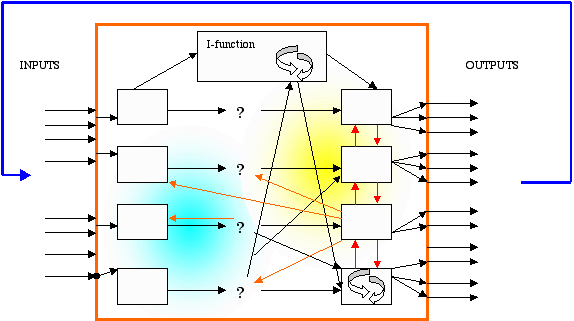
Seeing where we were, where we are ...

Problems solved, new issues raised ...
Moving on ... from "microscopic structure" (building blocks) toward bigger assemblies ...
Behavior
|
This made me wonder how useful it is to talk about our sensations and behaviors in terms of patterns of action potentials when nobody can really read/speak the language of action potentials (well, except for our neurons). To say that smiling, or tasting a sandwich or stubbing your toe ... is a pattern of action potentials oversimplifies these events. I can accept that action potentials trigger/mediate/modulate all brain events and I think that studying them is interesting and important ... but I don't want to miss the big picture. (Like looking at a Seurat painting from an inch away instead of from across the room) ... Carolyn I'm not sure I agree with the idea that we are unable to read the "language" of action potentials. I have been learning in another biology class about swimming in leeches. We stimulate the leech nervous system, and then watch as, on a computer screen, complex electronic equipment interprets electrical signals into a recognizable pattern. This pattern, whenever it shows up on a graph of leech nervous system potentials, signifies that the leech is swimming - even if all that remains of the leech is the nervous system - the body has been completely removed. This extremly recognizable pattern, i would say, is the "language" of the action potentials ... Carolyn The fact that the nervous system has the power to change itself is one of the most fascinating things I have learned so far in this class ... Andrew
Is there some kind of preemptive "thinking" going on inside the neuron. It seems that if the neuron modifies the signal, it must have some "understanding" of what kind of response the AP will ilicit. How is this possible? How then can the nervous system respond appropriately or coherently to completely new AP patterns? ... Rebecca I think the idea that most of what the nervous system does is inhibition very interesting. On a larger scale, is that what makes all kind of personalities different-exactly what we refrain from doing? ... As an infant/toddler you have to learn how to do all kinds of things-walk, make sounds, focus your eyes, etc. How much of that is inhibition-driven? How closely related is the inhibition of the running action potential pattern in chickens to human social inhibitions? ... Erin The case of the surgeon with Tourette's got me thinking about good ole action potentials. I thought maybe the part of the brain responsible for dealing with the action potentials involved in Tourettes was the same as those involved in surgery. I am not sure how this would work but if it were the same neural pathways necessary for both it seems possible that one action would trump the other ... Brom would this mean then that other people who have their tourettes "turned off" by, say, riding horses or baking have different pathways of action potentials than the man from the book? Then perhaps their symptoms are a result of completely different mental processes that somehow cause the same result? ... Marissa Yesterday, while studying for italian, I suddenly became aware that my sweater was itchy around my neck. I had been wearing the same sweater all day and so it had obviously been itchy all day, yet it wasn't until that moment that I felt uncomfortable. Thinking about this in terms of this class, I believe that my body probably felt the discomfort (and sent signals "about it") but because there was other stimuli that was more important at the moment, the signals were ignored. The random signal finally got through while I was studying because, perhaps, the signals that should have been perceived (italian) were boring. This leads me to question whether anything is ever really random ... Rachel I understand that the more one does something the more one can do it again--the process of engraining or conditioning is based on pattern recognition and replication. Is there a way to heighten the mind to patterns that are less 'visible' or straightforward to the five senses ... the world is always ripe with newer patterns and newer ways of perceiving it, which is why the meticulous deconstruction of nature (science) is only one story of getting one type of seeing less wrong ... ... Scott
how do we seperate the cognitive behaviors, such as thought or emotion, from the physical aspects of behavior, such as moving your hand? ... Is it the physical aspect of motion (such as smiling and then feeling happier), or is it the internal discussion that leads to a physical manifestation (frowning when confused) ... Caroline When do emotions stop being a choice and start being a function of our behavior (or the state of our brain)? Can some emotions be embedded in us/instinct? ... Ebony Isn't it interesting to think that such a complex emotional response as love is created by a hormone? ... Christin What if different people trigger different amounts of oxytocin and/or different mixes of other, related chemicals in our brain, and it's these various mixes that determine how we feel about each person...and a particular mix makes them our "special someone"? This mix is partially based on physical characteristics (what we first see), but also on what we know about the person, and so it can change over time ... If there are infinitely various brain setups, then there are infinitely various ways to process attraction and love, with only one of the facets being the gender(s) one happens to be attracted to ... Brittany A lot of people have been talking about oxytocin. Not only is it vital in female relations to infants, but it is also thought to be vital in male attachments to females and male caring for infants ... I wonder if this creates the huge variety of behaviors and ways in which different people react differently to relationships ... Could we build the perfect monogamous mate? ... Liz P. One of the major differences between addicts and non-addicts is the sensitivity of an individual's dopamine receptors in the brain ... If the same neurochemical present in all of us is responsible for both metal illness and infrastructural personality traits, what does that mean? Are all of the emotional/psychological/mental manifestations of the brain (all a series of action potentials) merely a function of the same few neurochemcial transmissions? Is personality the same as mental illness (on a neurobiological level)? How unromantic! ... Julia P. I never thought of putting epilepsy and obesity in the same thought ... Suzanne The implications of the differences between the brain of a "normal" person and the brain of a killer could be astounding. I wonder if, in the future, we might be able to provide a drug treatment for the condition rather than just imprisoning the person who committed the crime ... Anne-Marie the question posed might be "what causes these emotions, what sets the "baseline" for them, and how is it that they can change over time and be influenced by environment?" ... Jessica E.
All patterns of activity? Where? How created? How controlled/controllable? ... PG
The Unconscious Mind: A Great Decision Maker ... The unconscious mind doesn't seem to be a part of the "I" function we have been talking about in class. Then what is it? Just a pattern of action potentials? From the evidence of this case study, it seems like the pattern of action potentials that go "undetected" by the "I" function are not totally random since the participants were able to make a sound decision when distracted. So, does this pattern of action potentials have a pre-determined course/pattern in the CNS? If so, how are they determined? Genetics? Memory? ... Jen I was thinking about the subject of rationality and what I recently learned in a cognitive science class. There's a phenomenon called "probability blindness" that prevents us from seeing certain odds and probably is why we're such bad gamblers. I thought about this in relation to things we don't pick up on, like the infrared stuff ... So then, what is math? Are there some sorts of math that we don't pick up on, or is math something we've made up to understand the world? ... Suzanne
In my Learning Theory and Behavior class, we look at learning from a behavior analysts' point of view. Therefore, according to my professor, learning affects the brain not the brain affects learning. How do I know which one is right? I can see where he is coming from, yet isn't the only way you are able to learn is through patterns of action potentials? Help! ... Rachel F.
|
|
Fundamental Limitations on the Effectiveness of Drug Therapy Behavior consists of complex patterns of activity across large numbers of neurons Chemicals influence but do not determine those patterns There is no one to one relationship between a chemical and a pattern A given behavior may correspond to any of a number of different patterns and a given pattern may itself have a number of different causes There is, in addition, an element of unpredictability in the generation of the patterns And an important bidirectional exchange between the unconscious and the "I-function" Therefore ...
|
Begin (non-traditionally) with output - "action" (since not all outputs can be accounted for by inputs)
|
Action = "motor symphony" A new concept: the reafferent loop Accounting for motor symphony
| 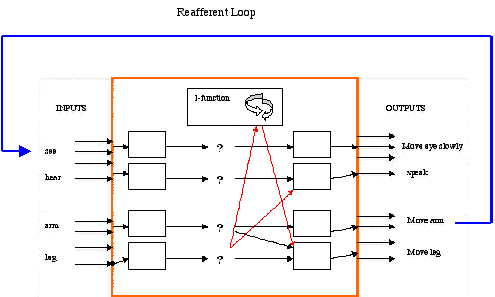
|
Preliminary human evidence?
Looking more closely at the "central pattern generation" hypothesis
Implications of earthworm case
To be continued
| Course Home Page
| Course Forum | Brain and
Behavior | Serendip Home |